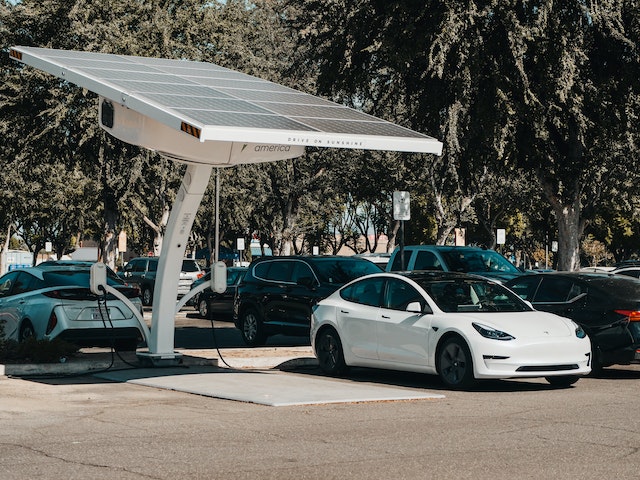
The electric vehicle (EV) revolution is gaining momentum worldwide, and India is no exception. As the country aims to reduce its carbon footprint and combat air pollution, the demand for electric vehicles is on the rise. To support this shift, a robust charging infrastructure is vital. In this blog, we will delve into the intricacies of setting up an EV charging station in India, exploring the costs, factors influencing them, and the potential for returns on this investment.
Introduction: The electric vehicle (EV) revolution is well underway, and India is poised to play a significant role in this global transition. As more and more people embrace EVs, the need for an extensive and efficient charging infrastructure becomes increasingly apparent. In this blog, we will delve into the specifics of setting up an EV charging station in India, offering a detailed breakdown of the costs involved in this transformative venture.
I. Types of EV Charging Stations
Before we get into the nitty-gritty of costs, let’s first understand the types of EV charging stations available in India:
- AC Charging Stations: These are primarily slow chargers suitable for home and office use, providing a lower charge rate. They are often used for overnight charging.
- DC Fast Charging Stations: DC fast chargers offer rapid charging, making them ideal for public locations, highways, and commercial establishments. They are more expensive but essential for reducing charging times.
- Battery Swapping Stations: Battery swapping is an emerging concept where depleted EV batteries are exchanged for fully charged ones. This method drastically reduces charging time and is gaining traction in the market.
II. Cost Breakdown
Setting up an EV charging station involves several components that contribute to the overall cost:
- Infrastructure Costs:
- Land or Space: The cost of acquiring or leasing land or space varies greatly depending on the location. Urban locations tend to be more expensive than rural ones.
- Construction: Building the station itself, including the construction of charging bays, structures, and utilities connection.
- Charging Equipment Costs:
- AC or DC Chargers: The choice of charging equipment significantly impacts costs. DC fast chargers are more expensive but provide quick charging, attracting more users.
- Installation and Commissioning:
- Installation: Installation costs are influenced by factors like site readiness and electrical work required.
- Commissioning: This step ensures that the charging station is functioning correctly, adhering to safety and operational standards.
- Operational Costs:
- Maintenance: Regular maintenance is required to ensure the chargers operate efficiently and safely.
- Electricity Charges: The cost of electricity, a major operational expense, can fluctuate based on the tariffs in your area.
- Network Management: You’ll need to manage the network, which includes user interfaces, payment systems, and customer support.
- Regulatory and Safety Compliance:
- Adhering to government regulations and safety standards is vital but may involve additional expenses, such as safety equipment and certification.

III. Factors Influencing Costs
Several factors can significantly influence the cost of establishing an EV charging station in India:
- Location: The location of the charging station is a primary cost determinant. Prime urban locations might have higher land and infrastructure costs, whereas rural areas could be more affordable.
- Charging Speed: The type of charger you choose has a significant impact. DC fast chargers are more expensive but attract more users due to their quick charging times.
- Grid Connection: The proximity to the grid connection point affects installation costs. A site closer to existing electrical infrastructure will be more cost-effective.
- Scalability: Planning for future growth and accommodating multiple charging stations at one site can increase costs but offers long-term advantages.
- Brand and Technology: The choice of charging equipment and technology provider can influence costs. Established brands may have higher upfront costs but offer reliability and customer trust.
- Government Incentives: The Indian government offers various incentives and subsidies to promote the development of EV charging stations, which can help offset some costs.
| Key Factors | Cost Range |
|---|---|
| New electricity connection | ₹7 Lakh – ₹7.5 lakh |
| Civil works | ₹3 lakh – ₹5 lakh |
| EVSE management software + Integration | ₹60,000 – ₹1.5 lakh |
| Technician and manpower, along with maintenance costs | ₹3.6 lakh per year |
| Advertising and promotion | ₹3 lakh – ₹5 lakh |
| Land lease | ~ ₹5 lakh – ₹10 lakh per year |
IV. Return on Investment (ROI)
Setting up an EV charging station involves a substantial upfront investment, but it’s crucial to evaluate the potential returns on this venture. Here are several key factors that contribute to a positive ROI:
- Usage Fees: Charging station operators have the opportunity to charge EV owners for using their services. This fee structure can vary based on factors such as charging speed, location, and the level of convenience provided. While the pricing strategy should remain competitive, it can create a steady revenue stream for the station operator. As the number of EV users grows, the potential for consistent income through usage fees increases.
- Growing EV Market: As the adoption of electric vehicles continues to rise in India, the demand for charging stations is expected to surge. This presents a significant advantage for charging station owners, as higher utilization rates mean greater returns on investment. With more EVs on the road, the charging station is more likely to remain occupied, leading to a reliable source of revenue.
- Government Support: In India, the government actively promotes electric vehicle adoption and supports the development of charging infrastructure through various incentives and policy measures. These initiatives can significantly reduce the burden of setup and operational costs. Financial incentives, subsidies, and favorable regulatory policies can make the establishment of EV charging stations more economically feasible and enhance the ROI potential.
- Branding and Partnerships: Collaborating with automakers and businesses can significantly boost the visibility and profitability of your charging station. Partnership agreements with EV manufacturers can provide exclusive charging privileges to their customers, creating a dedicated user base. Furthermore, collaborating with local businesses, such as shopping centers or restaurants, can enhance foot traffic to your station, increasing utilization rates and revenue.
- Operational Efficiency: Managing operational costs efficiently is essential for optimizing electricity usage and, in turn, improving ROI. To achieve this, regular maintenance of charging equipment is vital. Well-maintained chargers are more reliable, experience fewer breakdowns, and require fewer repairs, reducing overall operational expenses. Integrating smart grid technology can also help optimize electricity consumption, enabling cost-effective charging during off-peak hours and minimizing the station’s energy expenses.
V. Challenges and Future Outlook
While the prospect of setting up an EV charging station in India is indeed promising, there are several challenges that need to be addressed to ensure the long-term success of these ventures. Nevertheless, the future of EV charging infrastructure in India looks bright, with a growing market, government initiatives, and a strong push towards sustainability.
1. Regulatory Hurdles:
- Navigating Government Regulations: The regulatory environment surrounding EV charging stations can be complex and subject to change. Understanding and adhering to the evolving government regulations and obtaining the necessary permits can be a time-consuming and challenging process. Operators must stay updated on the latest policies and ensure compliance to avoid legal complications.
2. Competition:
- Intensifying Market Competition: As the electric vehicle charging market grows, competition is likely to intensify. Multiple players are entering the industry, creating a dynamic and competitive landscape. To thrive in this environment, charging station operators must focus on differentiation and providing excellent service. Offering unique features, user-friendly interfaces, and a seamless customer experience will be key to standing out in the crowd.
3. Grid Stability:
- Ensuring Grid Stability: With the proliferation of EVs and charging stations, ensuring grid stability becomes a critical concern. The increased load on the electrical grid due to rapid charging and simultaneous operation of multiple charging stations can lead to grid congestion and instability. Solutions like smart grid integration, demand-side management, and time-of-use pricing should be implemented to balance the load and prevent disruptions to the grid.
Despite these challenges, the future of EV charging infrastructure in India is promising:
- Growing Market: The adoption of electric vehicles in India is on the rise. With a growing number of consumers opting for EVs, the demand for charging stations will continue to increase. This expanding market provides ample opportunities for charging station operators to see a return on their investment.
- Government Initiatives: The Indian government is actively supporting the electric vehicle industry by offering financial incentives and policy support. These initiatives aim to accelerate the development of charging infrastructure and reduce barriers for entrepreneurs looking to set up EV charging stations. Government support, including subsidies and grants, can ease the financial burden and encourage more investment in charging infrastructure.
- Sustainability Push: The strong push towards sustainability, driven by environmental concerns and the need to reduce air pollution and carbon emissions, further reinforces the bright future of EV charging infrastructure in India. As more people and businesses transition to electric vehicles, the demand for charging stations will remain robust.
Conclusion
Establishing an EV charging station in India is a pivotal step in contributing to a cleaner, greener future. While the costs involved may seem significant, careful planning, consideration of influential factors, and a keen eye on market trends can help you not only make a valuable contribution to sustainability but also secure a viable return on your investment. The electric vehicle revolution in India is in full swing, and the charging infrastructure is the backbone that will fuel this transformation.







